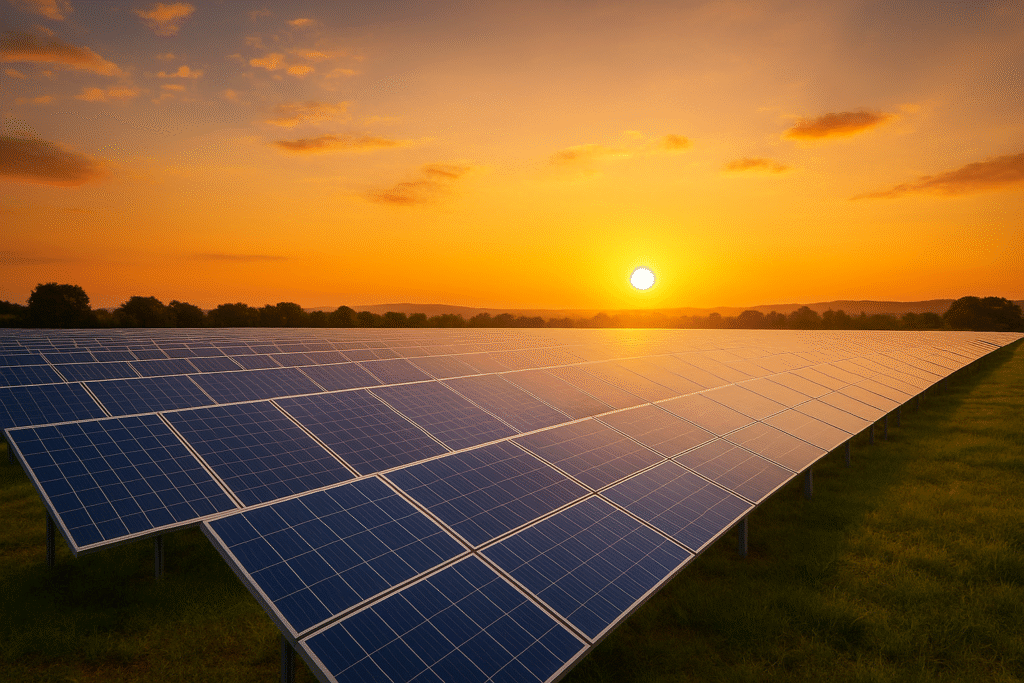Why Solar Energy Is a True Business Asset

Unlike traditional expenses such as utilities or fuel costs, solar systems are capital investments that appreciate in value over time. Once installed, they generate reliable energy for decades typically 25 years or more with minimal maintenance and predictable costs.
According to the U.S. Department of Energy, the average commercial solar system can offset a significant portion of a company’s electricity use, often reducing monthly bills by 50% or more. Those savings can then be reinvested into operations, marketing, or innovation giving your business more room to grow.
1. Solar Delivers Long-Term Financial Returns
Going solar isn’t an expense; it’s a high-yield investment. Businesses that install solar panels enjoy:
- Lower energy costs: Once your system is paid off, your power becomes nearly free.
- Tax incentives: Federal and state solar programs, like the Investment Tax Credit (ITC), can reduce installation costs by up to 30%.
- Accelerated depreciation: Under the Modified Accelerated Cost Recovery System (MACRS), businesses can deduct a significant portion of the system’s cost in the first year.
These financial benefits make solar one of the most practical and profitable sustainability moves a business can make.
2. Solar Improves Energy Stability and Control
Energy prices can fluctuate without warning, but solar offers long-term stability. Once your panels are in place, you lock in decades of predictable energy costs a huge advantage in uncertain markets.
When paired with battery storage technology, your system can even provide backup power during outages, ensuring uninterrupted operations. This reliability makes solar particularly valuable for warehouses, factories, retail centers, and offices that depend on consistent power supply.
3. Solar Power Can Instantly Boost Your Property’s Worth
If you think solar panels only save money on electricity, think again they can actually increase your property’s market value. Research from the Lawrence Berkeley National Laboratory found that commercial spaces with solar installations tend to sell faster and at higher prices than those without them.
For business owners, that means every ray of sunlight hitting your roof is adding long-term value to your property. Beyond slashing energy bills, a solar-powered building stands out to buyers and tenants who are looking for modern, energy-efficient spaces.
In short, going solar isn’t just a smart energy choice it’s a property upgrade that pays off whether you plan to sell, lease, or simply grow your business in the years ahead.
4. Solar Strengthens Brand Reputation
Modern consumers and partners care about sustainability and they reward businesses that take it seriously. By investing in solar, you’re demonstrating environmental leadership and responsibility.
This doesn’t just attract eco-conscious customers; it also improves relationships with investors, clients, and government entities who prioritize corporate sustainability. Over time, your solar initiative becomes a key part of your brand identity and competitive edge.
5. Solar Supports Long-Term Business Resilience
With energy costs and regulations changing rapidly, businesses that depend solely on traditional utilities face growing uncertainty. Solar, however, provides energy independence and shields your company from rising rates and supply chain disruptions.
In short, it’s not just a smart investment it’s a risk management tool that ensures long-term stability and resilience.
Making the Most of Your Solar Investment
Once you switch to solar, treat it as a long-term business asset that deserves strategy and care. Work with a certified solar provider to ensure top performance, and take advantage of tax credits and rebates to boost your ROI.
Consider battery storage or smart grid systems to enhance efficiency and reliability, and track your performance data to showcase savings and sustainability in your marketing.
By optimizing your solar system, you not only increase your financial return but also strengthen your brand as a forward-thinking, eco-conscious business leader.
Final Thoughts
Solar energy is one of the few investments that benefits both your bottom line and the planet. It cuts costs, builds brand equity, and provides lasting value all while aligning your business with a sustainable future.
Companies that view solar as a long-term asset, not just a utility upgrade, are positioning themselves for decades of success, savings, and stability.
Ready to Invest in the Future?
Turn your building into a long-term asset that pays dividends for years to come.
Explore commercial solar solutions today and see how your business can save more, grow faster, and lead responsibly.